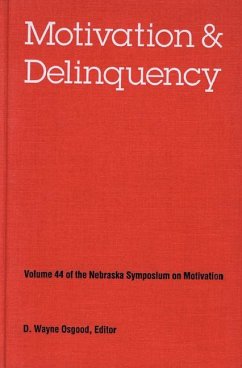Motivational concepts pervade the classic theories of delinquency. And yet, there has been little detailed analysis of the relationship between motivation and delinquency. In this 44th volume of the Nebraska Symposium on Motivation, a group of leading scholars in a broad range of fields make up for that scholarly negligence, giving explicit and systematic attention to the subject. Joan McCord opens the volume by considering fundamental questions about relationships between motivation, explanation, blame, and free will, thereby developing a base from which she poses a theory of motivation for crime. Michael Rutter and colleagues review findings concerning factors ranging from social organization to behavioral genetics; throughout, they grapple with various forms of delinquency, from common misbehavior to persistent personality disorder. Gerald Patterson and Karen Yoeger's chapter on late-onset delinquency extends their influential work and illustrates the application of behaviorist psychology that Patterson has been developing for over twenty years. James Tedeschi examines juvenile delinquency from the perspective of his social interactionist theory of violence; this theory, based on the social psychology of interdependence, construes violence as a coercive attempt at social influence. Finally, Karen Heimer and Ross Matsueda compare the study of delinquency by social psychologists in the fields of psychology and sociology and present their own symbolic interactionist theory of delinquency.
Hinweis: Dieser Artikel kann nur an eine deutsche Lieferadresse ausgeliefert werden.
Hinweis: Dieser Artikel kann nur an eine deutsche Lieferadresse ausgeliefert werden.








